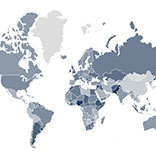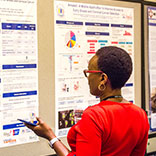Our studies ask important public health and clinical questions about environmental, socioeconomic, lifestyle, genetic, and other factors that may contribute to the incidence, recurrence, and mortality of different cancers, as well as health and quality of life afterward. We collaborate with researchers locally and across the world to reduce the burden of cancer through our work in three key areas of cancer epidemiology research: Etiology, Survivorship, and Intervention.
ON THIS PAGE
Chow Studies Group
The Chow Group is focused on improving the lives of cancer survivors, including survivors of both childhood and adult cancers. Projects include those that seek to identify epidemiologic risk factors for adverse outcomes, the creation of risk prediction models, and intervention studies that test both primary and secondary prevention strategies designed to reduce the burden of late effects.
HOPE Group
The HOPE (HIV Outcomes, Prevention and Epidemiology) Group uses a highly collaborative and multidisciplinary approach to evaluate prevention and treatment of HIV, with a focus on applicability to high-risk populations in low and middle income countries. Collaborators include laboratory scientists, economists, implementation scientists, and computational biologists to better understand how to prevent new HIV infections, as well as how to put new treatment ideas into action.
Li Lab
The Li Lab projects span breast and colorectal cancer early detection/screening, etiology, and survivorship. Projects are aimed at identifying novel biomarkers that could be used for the early detection of breast cancer, evaluating risk factors for different types of breast cancer, identifying predictors of poor outcomes among breast and colorectal cancer survivors, and assessing disparities in cancer stage, treatment and survival by race/ethnicity.
Lindström Lab
The Lindström Lab study the genetic contribution to complex disease with an emphasis on cancer. Working at the intersection of genetic epidemiology and statistical genetics, we interrogate large-scale-omics data to learn how genes and environment affect risk of developing disease.
Madeleine Lab
Dr. Madeleine's major research focus is the molecular epidemiology of pathogens and the immune response to them that may be associated with cancer development and prognosis. Her research interests include the role that chronic subclinical immune disregulation (such as occurs with age, obesity, physical inactivity, hormone use, and UV exposure) may play in carcinogenesis.
Mueller Lab
Dr. Mueller's research focuses on the roles of maternal, gestational, and early life factors and early environmental exposures in the occurrence of childhood cancer and autoimmune diseases. Additional research includes the reproductive history in relation to cancer and cancer survival in women and reproductive outcomes among male and female childhood cancer survivors.
Geospatial Exposome Lab
The Geospatial Exposome Lab (geoexlab), led by Dr. Trang VoPham, focuses on advancing research at the intersection of geospatial science, epidemiology, and the environment. We utilize and develop new geospatial methods to measure population-level environmental exposures in the exposome across the life course – to understand and prevent their impacts on health and well-being.

Breast Cancer Initiative 2.5 (BCI2.5)
We work toward the goals of making breast health a priority and reducing disparities in breast cancer outcomes worldwide.

Breast Health Global Initiative (BHGI)
We develop, implement and study guidelines to improve breast cancer screening, detection, treatment and outcomes.

Cancer Epidemiology Research Cooperative (CERC)
We focus on identifying the causes of cancer, factors associated with survival, the effects of cancer and cancer treatment on quality of life and overall health and testing strategies for prevention.

PNW Prostate Cancer SPORE
We seek to coordinate efforts to reduce morbidity and mortality associated with prostate cancer.
Bacterial Correlates of Colorectal Cancer Subtypes and Survival
Public Health Sciences, EpidemiologyScientists identify differences in the bacterial community in tumors for patients with etiologically-distinct subgroups of colorectal cancer, and how those differences relate to survival.
Funding Agency: National Cancer Institute
Contact: Amanda Phipps, aphipps@fredhutch.org
Case-control study of ovarian cancer (DOVE)
- Mary Anne Rossing, Ph.D., D.V.M.
- Holly Harris, Sc.D., M.P.H.
Using two ovarian cancer case-control studies, scientists are trying to determine why some women develop ovarian tumors and others do not.
Funding Agency: National Cancer Institute
Contact: Holly Harris, hharris@fredhutch.org
Colocare Study
Public Health Sciences, EpidemiologyColoCare is a research study for people newly diagnosed with colon or rectal cancer. It includes researchers, doctors, nurses, and patients working together to learn more about improving health after a cancer diagnosis.
Funding Agency: National Cancer Institute
Contact: Kathy Vickers, kvickers@fredhutch.org
Coordinating Center for the Population-based Research to Optimize the Screening PRocess (PROSPR) Consortium
Public Health Sciences, EpidemiologyBuilding on the success of PROSPR I, PROSPR II investigators from a variety of disciplines and institutions are conducting research to improve the screening of cervical, colorectal, and lung cancers.
Funding Agency: National Cancer Institute
Contact: Marty Stiller, mstiller@fredhutch.org
Dietary Intervention to Reduce Pain in People with Endometriosis
Public Health Sciences, EpidemiologyThis randomized controlled trial will investigate a 12-week dietary intervention based on the Alternative Healthy Eating Index, examining its effects on pain, quality of life, and inflammatory biomarkers among women with laparoscopically-confirmed endometriosis. The study results will help us identify evidence-based, modifiable, dietary factors that decrease pain and improve quality of life among women with endometriosis.
Funding Agency: National Institutes of Health/NINR
Contact: Nancy Blythe, endostudy@fredhutch.org
Echocardiographic Change in Cancer Survivors at Risk for Cardiomyopathy
Public Health Sciences, EpidemiologyScientists are comparing the echocardiographic changes in left ventricular function and geometry for survivors of childhood cancer who experienced cardiomyopathy to those of survivors who did not.
Funding Agency: National Cancer Institute
Contact: Nancy Blythe, nblythe@fredhutch.org
Effect of Weight Loss and Exercise on Biomarkers of Breast Cancer Risk
Public Health Sciences, EpidemiologyInvestigators explore microRNAs and their correlation to breast cancer biomarkers, how weight loss affects their relationship to cancer and obesity, and how the genes are expressed in fat tissue.
Funding Agency: Breast Cancer Research Foundation
Contact: Anne McTiernan, amctiern@fredhutch.org
Epidemiology of HPV-related SCC in Transplant Patients
Public Health Sciences, EpidemiologyUsing the same baseline cohort, scientists investigate the role of HPV in renal and cardiac organ transplant recipients in two complementary population-based studies.
Funding Agency: National Cancer Institute
Contact: Margaret Madeleine, mmadelei@fredhutch.org
Epidemiology of T-Cell Response in Colorectal Cancer
- Amanda Phipps, PhD
- Ulrike Peters, PhD
- SHUJI OGINO, MD HARVARD UNIVERSITY
Scientists measure aspects of the immune response in colorectal tumors, and relate that immune response to lifestyle factors, inherited genetic factors, and cancer survival.
Funding Agency: National Cancer Institute
Contact: Ulrike Peters, upeters@fredhutch.org
Epidemiology of the Four Most Frequent Cancers Following Breast Cancer (ORCA) Study
Public Health Sciences, EpidemiologyBreast cancer survivors have an increased risk of developing a second primary cancer. Researchers are studying the epidemiologic, clinical, and molecular determinants of the four most common types of second primary cancer diagnosed among breast cancer survivors.
Funding Agency: National Cancer Institute
Contact: Cecilia O'Brien, cobrien@fredhutch.org